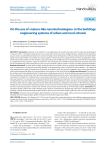Current issues of nanomaterials and nanotechnologies use in construction. Рубрика в журнале - Nanotechnologies in Construction: A Scientific Internet-Journal

Статья научная
Introduction. Recently, much attention in the publications of scientists has been paid to “nature-like technologies” in the use of RES – renewable energy sources (sun, wind, heat). At the same time, foreign business, despite the fact that these sources are low concentrated and seasonal, is actively investing in their development. In Russia, these processes have been developing slowly, and therefore, on the basis of a system analysis, it seems relevant to justify the correct vector of application of RES. The article provides evidence of the insolvency of opinions about the insufficiency of the assimilation potential of the biosphere to compensate for the economic activity of mankind. In this connection, the scientific, technical and socio-economic tasks arise for the “reengineering of the technosphere” in the structure of the life support systems of society, including educational facilities. Methods and models. To solve these scientific, technical and socio-economic issues, by analogy with individual residential buildings, it is proposed to use “nature-like nanotechnologies” in the engineering systems of schools, and for evaluation - the method of retro-forecasting the results of introduction of domestic innovations, which has proved its adequacy when solving the problems of fire and environmental safety of the technosphere in the regions of the South of Russia. Results and discussion. The results of the synthesis and “virtual implementation” of autonomous engineering systems for school buildings are presented, which allow for the decentralization of electricity, water and heat supply by generating resources (water, heat and electricity) using the “Shukhov wind-electric installations” combined with a vortex system extraction of moisture of air, with their duplication by hydro panels and solar batteries. The calculations have demonstrated that the putting into production of such domestic innovations and the «reengineering» with their help of the engineering systems of 40 thousand Russian schools will allow autonomization and proper electricity, water and heat supply, which will ensure their safe functioning in compliance with GOST 12.1.004. Moreover, after the introduction of an autonomous engineering system in the school, due to the annual savings in budget subsidies for “pedagogical services”, it becomes possible to increase the monthly salary of each school teacher by 30–40 thousand rubles. Conclusion. The conducted studies confirm the results obtained in the synthesis of autonomous engineering systems for individual residential buildings, unequivocally determining the place of RES in the structure of resource supply systems for cities and rural settlements.
Бесплатно

